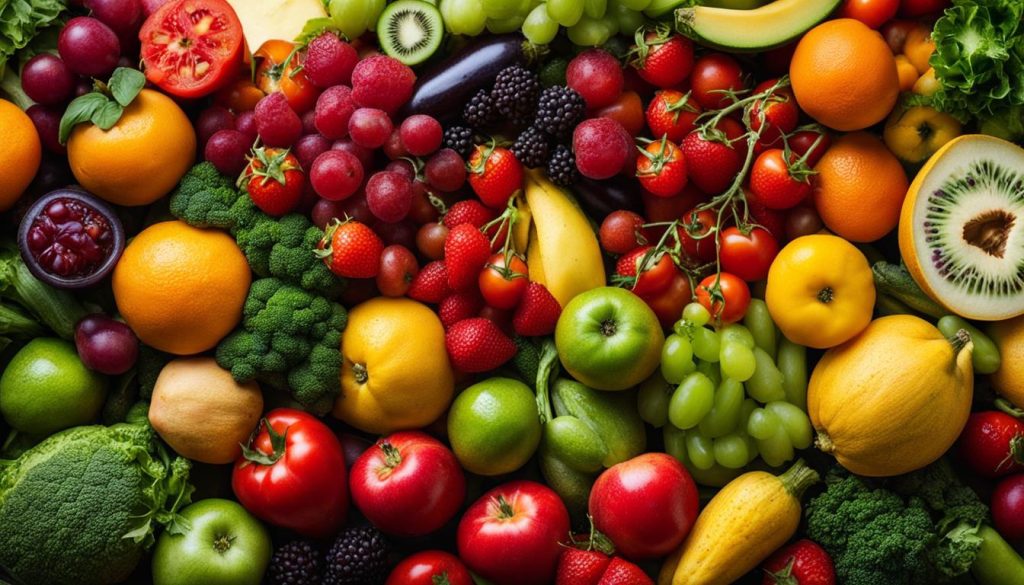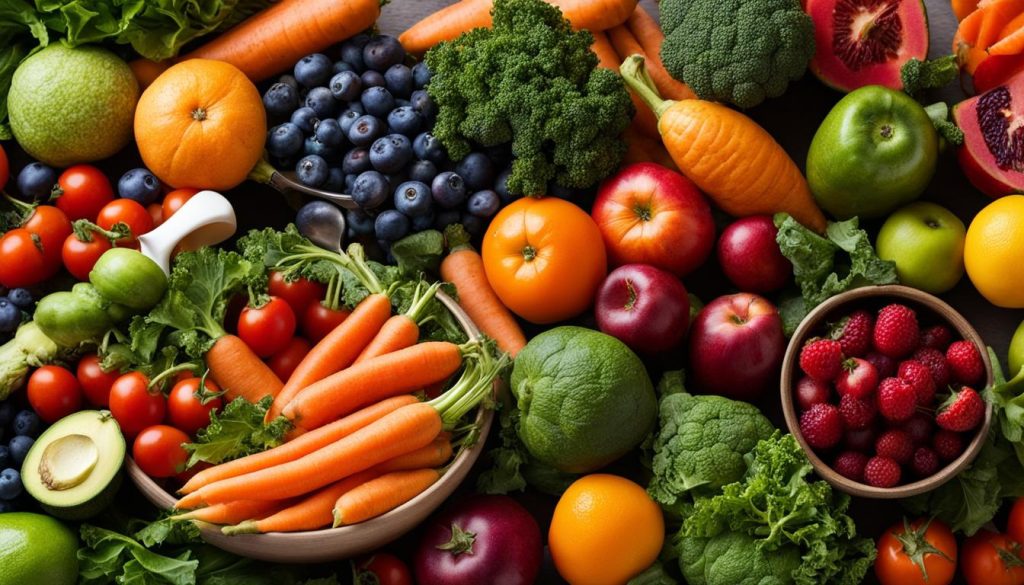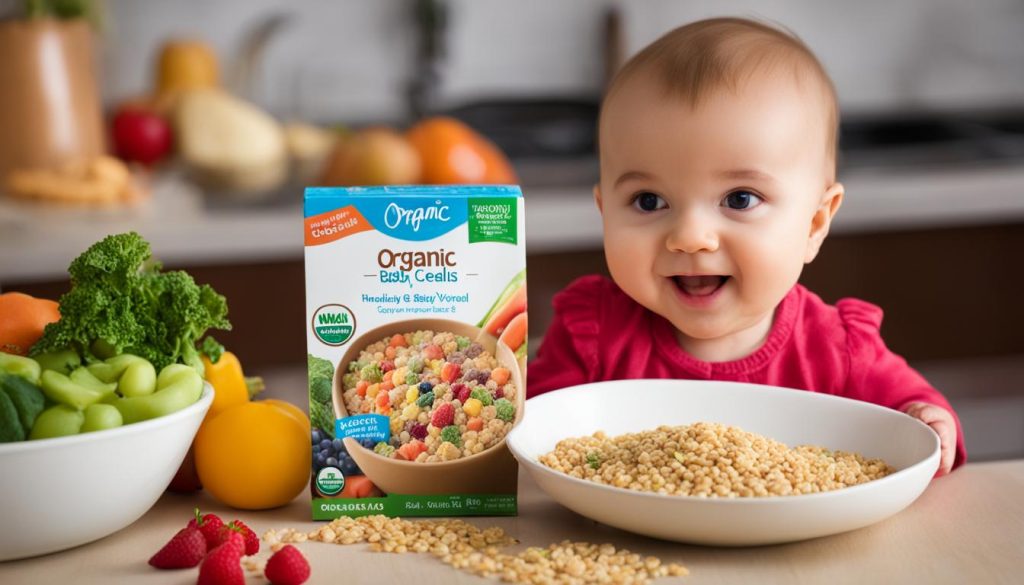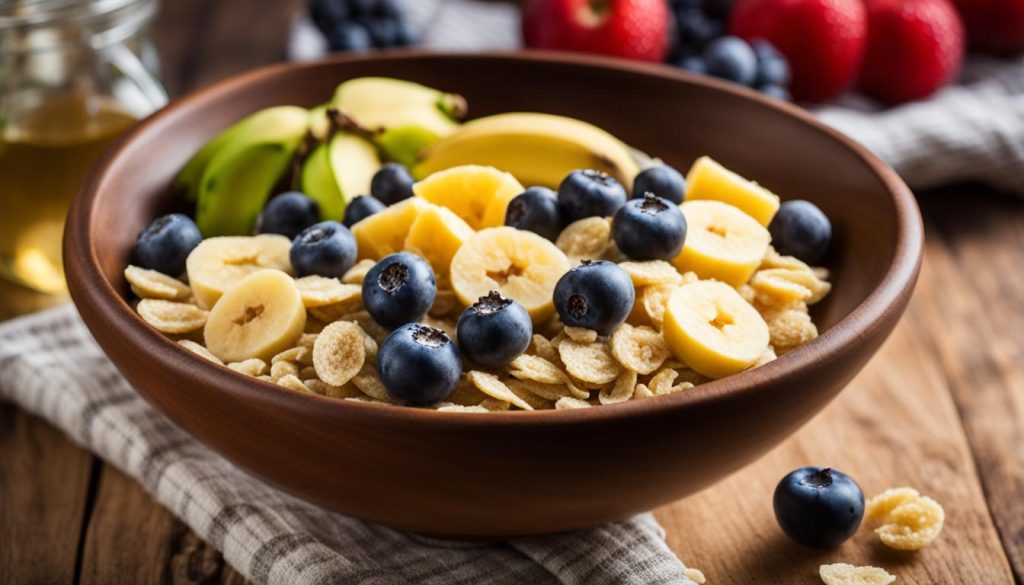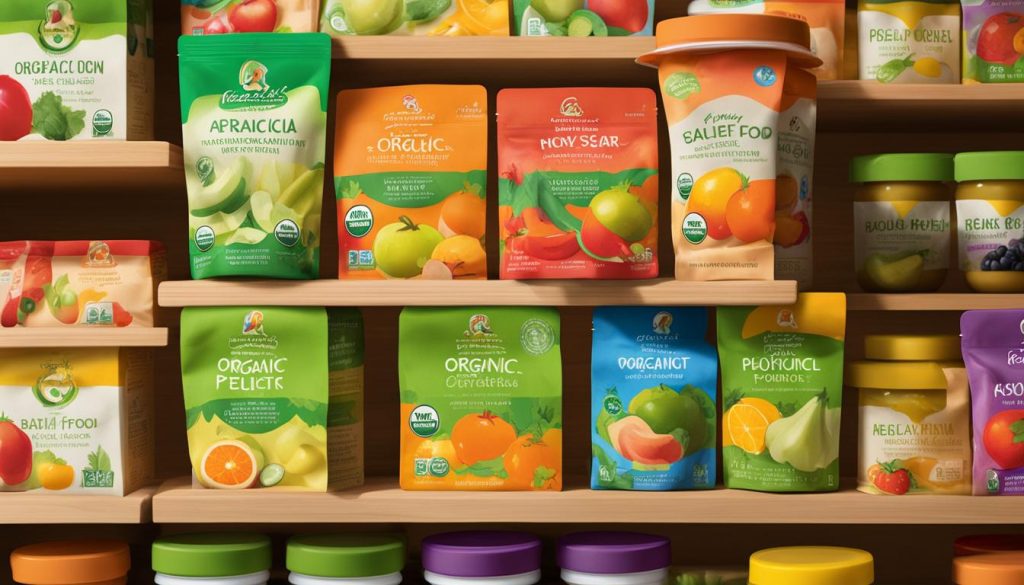As a parent, one of the crucial decisions you’ll make is what to feed your baby. With the growing popularity of organic food, you may be wondering if organic baby food is the right choice for your little one. In this article, I’ll explore the differences between organic and regular baby food and the potential benefits of choosing organic options.
Before we dive into the specifics, let’s clarify what “organic” means. In the United States, organic labeling indicates that a product has been produced according to standards set by the USDA. These standards include the absence of conventional pesticides, genetic engineering (GMOs), and routine antibiotics. Organic foods come in different categories, such as 100 percent organic, organic, made with organic ingredients, and specific organic ingredients.
While there’s no definitive answer to the organic vs. nonorganic debate, choosing organic baby food may help reduce pesticide exposure in children. Studies suggest that organic food consumption can lead to positive health outcomes, including reduced occurrences of infertility, birth defects, allergies, ear infections, and metabolic syndrome.
When it comes to the differences between organic and regular baby food, the main distinction lies in the production methods. Organic baby food is made from ingredients grown without the use of pesticides, synthetic fertilizers, GMOs, or ionizing radiation. On the other hand, regular baby food may contain conventionally grown ingredients that can be exposed to pesticides.
While studies show that organic and regular baby food have similar overall nutritional content, organic baby food may have a slightly lower risk of pesticide contamination.
Now that we have a better understanding of the differences, in the following sections, we’ll delve deeper into the benefits of organic baby food, the best organic baby food brands, and some essential tips for parents choosing baby food.
Benefits of Organic Baby Food
When it comes to choosing baby food for your little one, organic options have gained popularity in recent years. While research on the specific benefits of organic baby food is ongoing, there are several potential advantages to consider.
One of the main reasons parents opt for organic baby food is to reduce pesticide exposure. Organic foods are produced without the use of conventional pesticides, which can be especially important for babies whose smaller bodies may be more susceptible to the harmful effects of these chemicals. By choosing organic, you can have peace of mind knowing that you are offering your baby food that has been produced using stricter standards.
In addition to reduced pesticide exposure, organic baby food may also have health benefits. Studies suggest that organic foods may contain lower levels of antibiotic-resistant bacteria and may be associated with a reduced risk of certain health issues, such as allergies, ear infections, and metabolic syndrome. However, it’s important to note that the overall health benefits of organic baby food are still a topic of ongoing research and debate.
It’s worth mentioning that regardless of whether you choose organic or regular baby food, a varied diet rich in fruits, vegetables, and whole grains is key to providing essential nutrients for your baby’s growth and development. Ultimately, the decision to choose organic baby food is a personal one based on your beliefs and priorities as a parent.
Table: Dirty Dozen and Clean Fifteen
| Dirty Dozen | Clean Fifteen |
|---|---|
| Strawberries | Avocados |
| Spinach | Sweet Corn |
| Kale | Pineapple |
| Nectarines | Onions |
| Apples | Papayas |
| Grapes | Sweet Peas |
| Peaches | Eggplants |
| Cherries | Asparagus |
| Pears | Broccoli |
| Tomatoes | Cabbage |
| Celery | Cauliflower |
| Potatoes | Watermelon |
“The decision to go organic or not is a personal one, and there are valid reasons on both sides. Making informed choices and offering your baby a variety of nutritious foods is key to their overall health and development.” – Dr. Sarah Johnson, Pediatrician
In summary, organic baby food offers potential benefits such as reduced pesticide exposure and lower levels of antibiotic-resistant bacteria. However, it’s important to note that research on the specific health benefits of organic baby food is ongoing. Regardless of whether you choose organic or regular baby food, providing a balanced and varied diet is crucial for your baby’s overall health and development.
Differences Between Organic and Regular Baby Food
When it comes to choosing baby food for your little one, it’s important to understand the differences between organic and regular options. Organic baby food is made from ingredients that are grown without the use of pesticides, synthetic fertilizers, GMOs, or ionizing radiation.
On the other hand, regular baby food may contain conventionally grown ingredients that can be exposed to pesticides. While organic baby food typically uses certified organic ingredients, regular baby food may contain a combination of organic and nonorganic ingredients.
In terms of nutritional content, studies have shown that organic and regular baby food are similar overall. However, organic baby food may have a slightly lower risk of pesticide contamination. It’s worth noting that both organic and regular baby food provide essential nutrients and can be a healthy choice for your baby.
When deciding between organic and regular baby food, it’s important to consider factors such as your budget, accessibility to organic options, and personal preferences. Ultimately, the decision should be based on what works best for you and your baby’s needs.
Table: Organic vs. Regular Baby Food Comparison
| Criteria | Organic Baby Food | Regular Baby Food |
|---|---|---|
| Ingredients | Grown without pesticides, synthetic fertilizers, GMOs, or ionizing radiation | May contain conventionally grown ingredients exposed to pesticides |
| Certification | Uses certified organic ingredients | May contain a combination of organic and nonorganic ingredients |
| Nutritional Content | Similar overall, with a slightly lower risk of pesticide contamination | Similar overall, but may have a higher risk of pesticide contamination |
| Cost | May be more expensive | May be more affordable |
| Availability | May have limited availability depending on location | Widely available |
Best Organic Baby Food Brands
When it comes to choosing organic baby food, there are several top brands that parents can rely on. These brands prioritize the use of organic ingredients and offer a wide range of options for babies, from purees to snacks and meals. Here are some of the best organic baby food brands:
- Beech-Nut
- Earth’s Best
- Happy Family Organics
- Gerber Organic
- Plum Organics
These brands have established themselves as trusted providers of organic baby food, ensuring that the products meet the standards for organic certification. They understand the importance of offering nutritious and safe options for little ones.
When choosing organic baby food, it’s essential to read the labels and ingredients to ensure that they align with your standards. Each brand may have a slightly different approach and variety of flavors, so exploring different options can help introduce a diverse range of tastes to your baby.
Remember, the ultimate decision lies with you as a parent, based on your beliefs, priorities, and the specific needs of your child. Consult with your pediatrician or a registered dietitian for personalized advice and guidance on selecting the best organic baby food options for your little one.
| Brand | Product Range | Popular Products |
|---|---|---|
| Beech-Nut | Purees, cereals, snacks | Organic Apple & Pumpkin Puree, Organic Oatmeal Cereal, Organic Puffs |
| Earth’s Best | Purees, pouches, snacks, formula | Organic Carrot & Pea Puree, Organic Rice Cereal, Organic Pouches Variety Pack |
| Happy Family Organics | Purees, pouches, snacks, meals | Organic Pear & Spinach Puree, Organic Teething Wafers, Organic Stage 2 Pouches |
| Gerber Organic | Purees, cereals, snacks, meals | Organic Banana Puree, Organic Oatmeal Cereal, Organic Yogurt Melts |
| Plum Organics | Purees, pouches, snacks, meals | Organic Sweet Potato Puree, Organic Mighty 4 Pouches, Organic Baby Bowls |
Why Choose Organic Baby Food?
Choosing organic baby food for your little one can have several important benefits. One of the main reasons parents opt for organic options is to reduce pesticide exposure. Organic baby food is produced without the use of conventional pesticides, which can be harmful to a baby’s developing immune system. By choosing organic, you can minimize your child’s exposure to potentially harmful chemicals and promote their overall health and well-being.
Another reason why parents choose organic baby food is to support sustainable and environmentally friendly farming practices. Organic farming methods prioritize soil health, water conservation, and biodiversity, making it a more eco-friendly choice. By purchasing organic baby food, you are contributing to a more sustainable food system and helping to protect the planet for future generations.
Some parents also believe that organic baby food tastes better and is of higher quality compared to nonorganic options. While taste preferences can vary from person to person, organic baby food is often made from high-quality ingredients that are carefully selected for their nutritional value. It provides peace of mind to parents knowing that they are feeding their little ones wholesome and nutritious meals.
The Importance of Organic Baby Food
Organic baby food offers numerous benefits, including reduced pesticide exposure, support for sustainable farming practices, and potentially better taste and quality. As a parent, it’s essential to make informed choices about your child’s diet, taking into consideration their health, the environment, and their taste preferences. By choosing organic baby food, you can provide your little one with a nourishing and wholesome diet while also promoting a healthier and more sustainable food system.
Remember, every little step towards choosing organic and sustainable options can make a difference, both for your child’s well-being and the health of the planet.
Tips for Parents Choosing Baby Food
When it comes to choosing baby food, whether organic or regular, there are some tips that parents can keep in mind:
1. Read the labels and ingredients: Take the time to carefully read the labels and ingredients of the baby food you are considering. Look for organic options that use certified organic ingredients and avoid products that contain artificial additives, excessive sugar, or salt. Understanding what is in the baby food will help you make informed choices for your little one’s nutrition.
2. Consider your baby’s specific needs: Every baby is unique, and it’s important to consider your baby’s specific needs and preferences when choosing baby food. Take into account any known food allergies or sensitivities and choose options that align with your baby’s dietary requirements.
3. Introduce variety: As your baby grows, it’s important to introduce a variety of flavors and textures to expand their palate. Offering a diverse range of foods can help cultivate healthy eating habits and expose your baby to a wide array of nutrients.
4. Seek professional advice: If you have any concerns or questions about choosing the best baby food options for your child, consult with your pediatrician or a registered dietitian. They can provide personalized guidance based on your baby’s individual needs and help you make the right choices for their nutrition.
By following these tips, you can confidently navigate the world of baby food and choose options that are best for your little one’s health and well-being.
FAQ
Is organic baby food healthier than regular baby food?
Organic baby food is produced without the use of pesticides, synthetic fertilizers, GMOs, or ionizing radiation. While studies have shown that organic and regular baby food have similar nutritional content, organic baby food may have a slightly lower risk of pesticide contamination.
Can organic baby food reduce pesticide exposure in children?
Yes, choosing organic baby food may reduce pesticide exposure in children. Organic foods are produced without conventional pesticides, genetic engineering (GMOs), and routine antibiotics, which can help decrease the presence of harmful chemicals in your child’s diet.
Are there any specific health benefits of organic baby food?
While research is not entirely conclusive, studies suggest that consuming organic food may reduce pesticide exposure and antibiotic-resistant bacteria. Organic food may also have positive outcomes related to reduced occurrences of infertility, birth defects, allergies, ear infections, and metabolic syndrome.
What is the main difference between organic and regular baby food?
The main difference lies in the production methods. Organic baby food is made from ingredients that are grown without the use of pesticides, synthetic fertilizers, GMOs, or ionizing radiation. Regular baby food may contain conventionally grown ingredients that can be exposed to pesticides.
Which brands offer organic baby food options?
Some of the top organic baby food brands include Beech-Nut, Earth’s Best, Happy Family Organics, Gerber Organic, and Plum Organics. These brands offer a wide range of organic baby food options, including purees, snacks, and meals.
Why do parents choose organic baby food for their little ones?
There are several reasons why parents may choose organic baby food. One main reason is to reduce pesticide exposure, as babies may be more vulnerable to the harmful effects of pesticides. Choosing organic baby food can also be seen as a way to support sustainable and environmentally friendly farming practices.
What should parents consider when choosing baby food?
When choosing baby food, parents should read the labels and ingredients to understand what is in the baby food. Look for organic baby food that uses certified organic ingredients and avoid products that contain artificial additives or excessive amounts of sugar or salt. Consider your baby’s specific needs and preferences, and consult with a healthcare professional for personalized advice and guidance.

